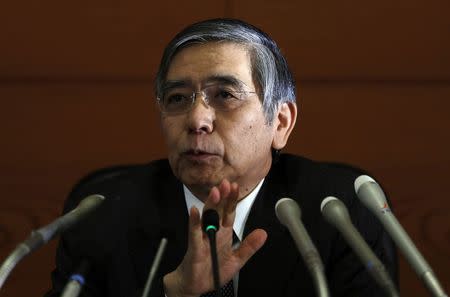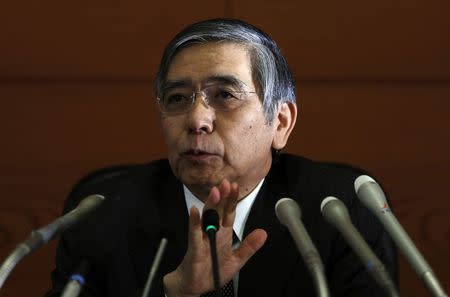BoJ has many policy easing options if needed -Kuroda
By Jonathan Spicer
NEW YORK (Reuters) - The Bank of Japan has many tools available if it were to ease monetary policy further, Governor Haruhiko Kuroda said, adding that the Japanese government bond (JGB) market is a "huge" one among various financial assets the central bank can tap.
"There are many options available, and if necessary we will not hesitate to make any necessary and appropriate" moves to achieve the the BOJ's 2 percent inflation target, Kuroda told the Economic Club of New York on Wednesday.
"In Japan there are so many financial assets to be purchased by a central bank. We have been purchasing long term government bonds," as well as risky assets such as corporate bonds and exchange-traded funds, he said.
"The JGB market is huge," he added.
Kuroda maintained his optimistic view on the economy, saying that it will continue to recover moderately as the pain from a sales tax hike in April on household spending ebbs.
But he stressed that the central bank will continue its quantitative easing for as long as necessary, and is ready to expand it if necessary, to meet its 2 percent inflation target.
"Japan's economy has been on a path suggesting that the 2 percent price stability target will be achieved as expected. Yet, we need to raise inflation rates and inflation expectations further towards 2 percent and thus we are only halfway there," Kuroda said.
"If the outlook changes due to the manifestation of risk factors ... the Bank will make adjustments without hesitation. Let me emphasise that our commitment is result-oriented," he said.
Kuroda is visiting the United States to attend the Group of 20 finance leaders' gathering and the International Monetary Fund meetings this weekend.
The BOJ has stood pat on monetary policy since deploying an intense burst of stimulus in April last year, when it pledged to achieve its 2 percent inflation in roughly two years via aggressive asset purchases.
Kuroda has remained optimistic about the economy and has signalled that no imminent monetary easing was on the horizon, despite a slew of recent weak data that sugggested Japan may have experienced a mild recession as the tax hike and bad summer weather hit consumption.
(Additional reporting by Leika Kihara in Washington; Editing by Diane Craft & Kim Coghill)





